Pharma-Society: The Impact and Concepts of Pharmaceuticalization
VerifiedAdded on 2023/03/31
|12
|2303
|251
AI Summary
This article explores the impact and concepts of pharmaceuticalization in the modern Pharma-Society. It discusses the role of pharmaceutical industries in developing and marketing drugs, the rise of consumer influence, and various concepts such as pharmaceuticalisation, medicalization, biomedicalisation, and biopolitics. It also delves into specific areas of pharmaceutical research and practice, including synthetic drugs, pharmaceutical chemistry, and pharmaceutical historiography.
Contribute Materials
Your contribution can guide someone’s learning journey. Share your
documents today.
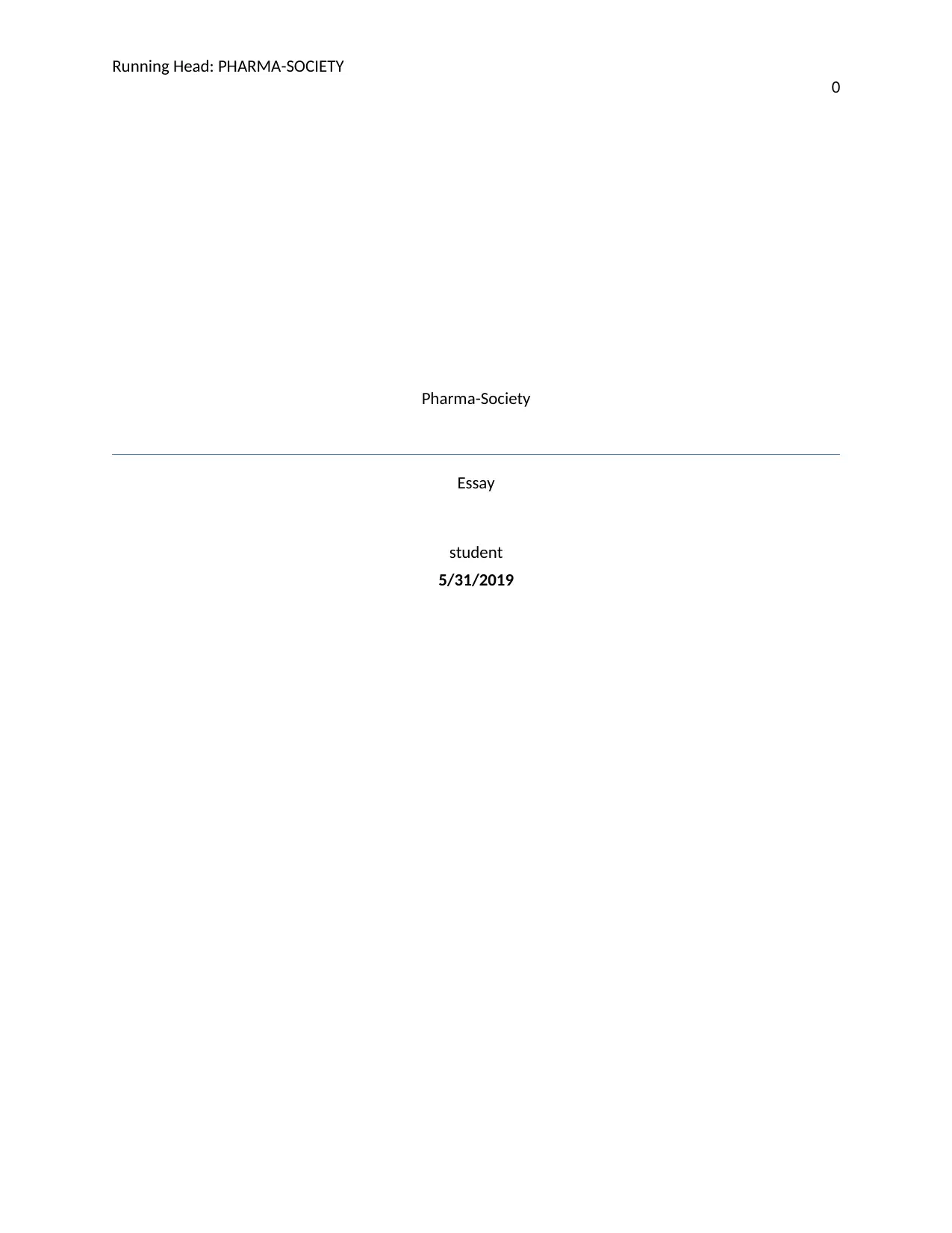
Running Head: PHARMA-SOCIETY
0
Pharma-Society
Essay
student
5/31/2019
0
Pharma-Society
Essay
student
5/31/2019
Secure Best Marks with AI Grader
Need help grading? Try our AI Grader for instant feedback on your assignments.
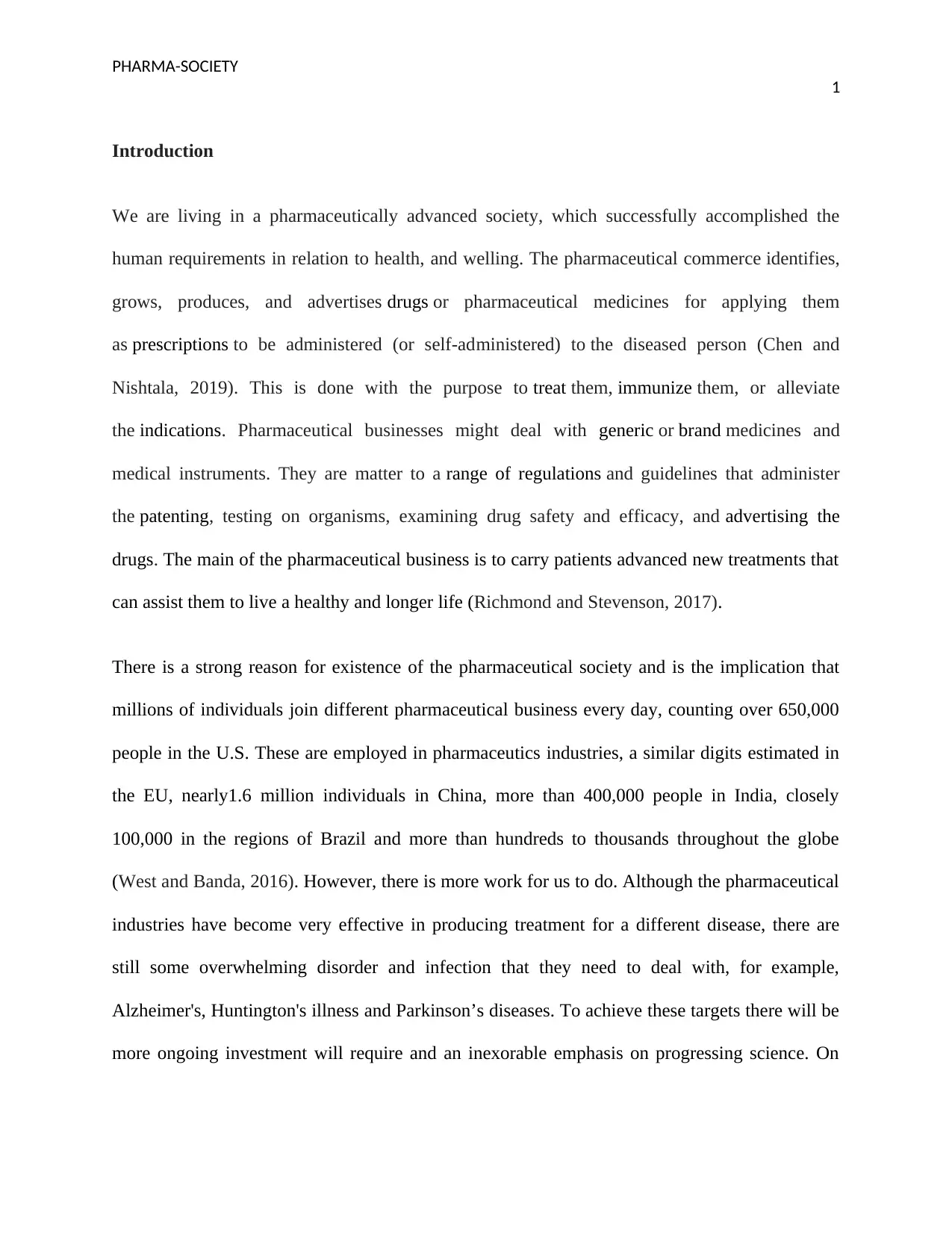
PHARMA-SOCIETY
1
Introduction
We are living in a pharmaceutically advanced society, which successfully accomplished the
human requirements in relation to health, and welling. The pharmaceutical commerce identifies,
grows, produces, and advertises drugs or pharmaceutical medicines for applying them
as prescriptions to be administered (or self-administered) to the diseased person (Chen and
Nishtala, 2019). This is done with the purpose to treat them, immunize them, or alleviate
the indications. Pharmaceutical businesses might deal with generic or brand medicines and
medical instruments. They are matter to a range of regulations and guidelines that administer
the patenting, testing on organisms, examining drug safety and efficacy, and advertising the
drugs. The main of the pharmaceutical business is to carry patients advanced new treatments that
can assist them to live a healthy and longer life (Richmond and Stevenson, 2017).
There is a strong reason for existence of the pharmaceutical society and is the implication that
millions of individuals join different pharmaceutical business every day, counting over 650,000
people in the U.S. These are employed in pharmaceutics industries, a similar digits estimated in
the EU, nearly1.6 million individuals in China, more than 400,000 people in India, closely
100,000 in the regions of Brazil and more than hundreds to thousands throughout the globe
(West and Banda, 2016). However, there is more work for us to do. Although the pharmaceutical
industries have become very effective in producing treatment for a different disease, there are
still some overwhelming disorder and infection that they need to deal with, for example,
Alzheimer's, Huntington's illness and Parkinson’s diseases. To achieve these targets there will be
more ongoing investment will require and an inexorable emphasis on progressing science. On
1
Introduction
We are living in a pharmaceutically advanced society, which successfully accomplished the
human requirements in relation to health, and welling. The pharmaceutical commerce identifies,
grows, produces, and advertises drugs or pharmaceutical medicines for applying them
as prescriptions to be administered (or self-administered) to the diseased person (Chen and
Nishtala, 2019). This is done with the purpose to treat them, immunize them, or alleviate
the indications. Pharmaceutical businesses might deal with generic or brand medicines and
medical instruments. They are matter to a range of regulations and guidelines that administer
the patenting, testing on organisms, examining drug safety and efficacy, and advertising the
drugs. The main of the pharmaceutical business is to carry patients advanced new treatments that
can assist them to live a healthy and longer life (Richmond and Stevenson, 2017).
There is a strong reason for existence of the pharmaceutical society and is the implication that
millions of individuals join different pharmaceutical business every day, counting over 650,000
people in the U.S. These are employed in pharmaceutics industries, a similar digits estimated in
the EU, nearly1.6 million individuals in China, more than 400,000 people in India, closely
100,000 in the regions of Brazil and more than hundreds to thousands throughout the globe
(West and Banda, 2016). However, there is more work for us to do. Although the pharmaceutical
industries have become very effective in producing treatment for a different disease, there are
still some overwhelming disorder and infection that they need to deal with, for example,
Alzheimer's, Huntington's illness and Parkinson’s diseases. To achieve these targets there will be
more ongoing investment will require and an inexorable emphasis on progressing science. On
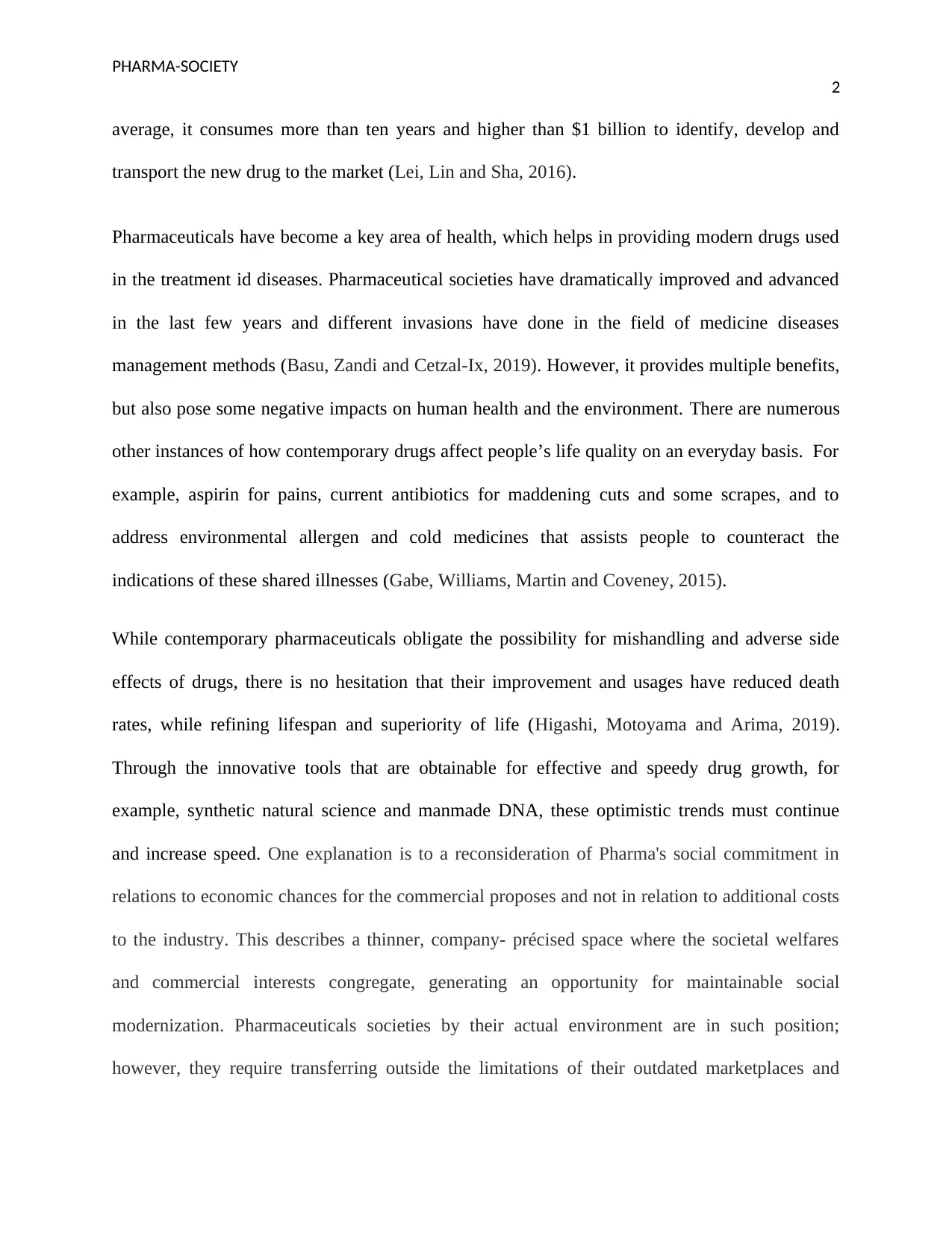
PHARMA-SOCIETY
2
average, it consumes more than ten years and higher than $1 billion to identify, develop and
transport the new drug to the market (Lei, Lin and Sha, 2016).
Pharmaceuticals have become a key area of health, which helps in providing modern drugs used
in the treatment id diseases. Pharmaceutical societies have dramatically improved and advanced
in the last few years and different invasions have done in the field of medicine diseases
management methods (Basu, Zandi and Cetzal-Ix, 2019). However, it provides multiple benefits,
but also pose some negative impacts on human health and the environment. There are numerous
other instances of how contemporary drugs affect people’s life quality on an everyday basis. For
example, aspirin for pains, current antibiotics for maddening cuts and some scrapes, and to
address environmental allergen and cold medicines that assists people to counteract the
indications of these shared illnesses (Gabe, Williams, Martin and Coveney, 2015).
While contemporary pharmaceuticals obligate the possibility for mishandling and adverse side
effects of drugs, there is no hesitation that their improvement and usages have reduced death
rates, while refining lifespan and superiority of life (Higashi, Motoyama and Arima, 2019).
Through the innovative tools that are obtainable for effective and speedy drug growth, for
example, synthetic natural science and manmade DNA, these optimistic trends must continue
and increase speed. One explanation is to a reconsideration of Pharma's social commitment in
relations to economic chances for the commercial proposes and not in relation to additional costs
to the industry. This describes a thinner, company- précised space where the societal welfares
and commercial interests congregate, generating an opportunity for maintainable social
modernization. Pharmaceuticals societies by their actual environment are in such position;
however, they require transferring outside the limitations of their outdated marketplaces and
2
average, it consumes more than ten years and higher than $1 billion to identify, develop and
transport the new drug to the market (Lei, Lin and Sha, 2016).
Pharmaceuticals have become a key area of health, which helps in providing modern drugs used
in the treatment id diseases. Pharmaceutical societies have dramatically improved and advanced
in the last few years and different invasions have done in the field of medicine diseases
management methods (Basu, Zandi and Cetzal-Ix, 2019). However, it provides multiple benefits,
but also pose some negative impacts on human health and the environment. There are numerous
other instances of how contemporary drugs affect people’s life quality on an everyday basis. For
example, aspirin for pains, current antibiotics for maddening cuts and some scrapes, and to
address environmental allergen and cold medicines that assists people to counteract the
indications of these shared illnesses (Gabe, Williams, Martin and Coveney, 2015).
While contemporary pharmaceuticals obligate the possibility for mishandling and adverse side
effects of drugs, there is no hesitation that their improvement and usages have reduced death
rates, while refining lifespan and superiority of life (Higashi, Motoyama and Arima, 2019).
Through the innovative tools that are obtainable for effective and speedy drug growth, for
example, synthetic natural science and manmade DNA, these optimistic trends must continue
and increase speed. One explanation is to a reconsideration of Pharma's social commitment in
relations to economic chances for the commercial proposes and not in relation to additional costs
to the industry. This describes a thinner, company- précised space where the societal welfares
and commercial interests congregate, generating an opportunity for maintainable social
modernization. Pharmaceuticals societies by their actual environment are in such position;
however, they require transferring outside the limitations of their outdated marketplaces and
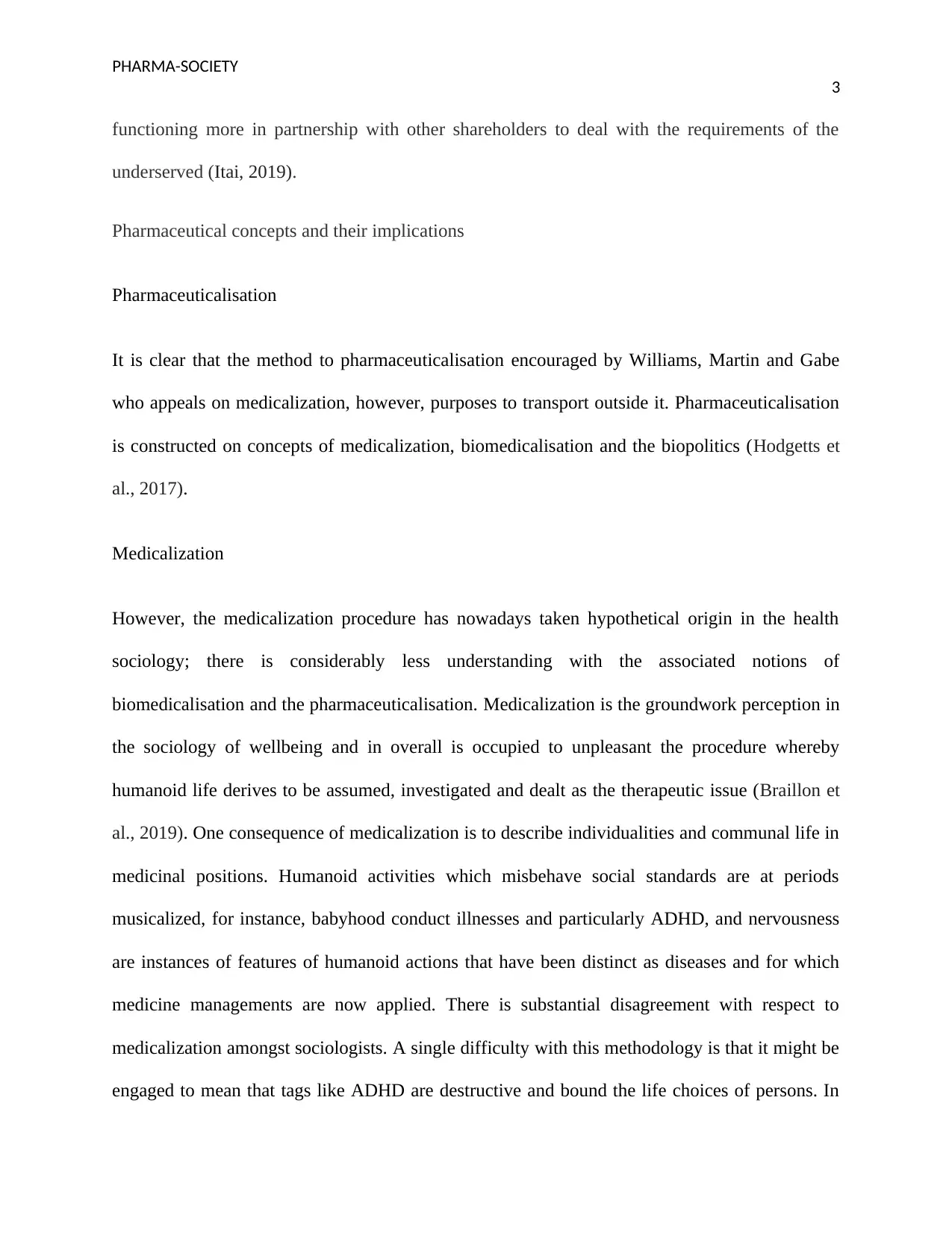
PHARMA-SOCIETY
3
functioning more in partnership with other shareholders to deal with the requirements of the
underserved (Itai, 2019).
Pharmaceutical concepts and their implications
Pharmaceuticalisation
It is clear that the method to pharmaceuticalisation encouraged by Williams, Martin and Gabe
who appeals on medicalization, however, purposes to transport outside it. Pharmaceuticalisation
is constructed on concepts of medicalization, biomedicalisation and the biopolitics (Hodgetts et
al., 2017).
Medicalization
However, the medicalization procedure has nowadays taken hypothetical origin in the health
sociology; there is considerably less understanding with the associated notions of
biomedicalisation and the pharmaceuticalisation. Medicalization is the groundwork perception in
the sociology of wellbeing and in overall is occupied to unpleasant the procedure whereby
humanoid life derives to be assumed, investigated and dealt as the therapeutic issue (Braillon et
al., 2019). One consequence of medicalization is to describe individualities and communal life in
medicinal positions. Humanoid activities which misbehave social standards are at periods
musicalized, for instance, babyhood conduct illnesses and particularly ADHD, and nervousness
are instances of features of humanoid actions that have been distinct as diseases and for which
medicine managements are now applied. There is substantial disagreement with respect to
medicalization amongst sociologists. A single difficulty with this methodology is that it might be
engaged to mean that tags like ADHD are destructive and bound the life choices of persons. In
3
functioning more in partnership with other shareholders to deal with the requirements of the
underserved (Itai, 2019).
Pharmaceutical concepts and their implications
Pharmaceuticalisation
It is clear that the method to pharmaceuticalisation encouraged by Williams, Martin and Gabe
who appeals on medicalization, however, purposes to transport outside it. Pharmaceuticalisation
is constructed on concepts of medicalization, biomedicalisation and the biopolitics (Hodgetts et
al., 2017).
Medicalization
However, the medicalization procedure has nowadays taken hypothetical origin in the health
sociology; there is considerably less understanding with the associated notions of
biomedicalisation and the pharmaceuticalisation. Medicalization is the groundwork perception in
the sociology of wellbeing and in overall is occupied to unpleasant the procedure whereby
humanoid life derives to be assumed, investigated and dealt as the therapeutic issue (Braillon et
al., 2019). One consequence of medicalization is to describe individualities and communal life in
medicinal positions. Humanoid activities which misbehave social standards are at periods
musicalized, for instance, babyhood conduct illnesses and particularly ADHD, and nervousness
are instances of features of humanoid actions that have been distinct as diseases and for which
medicine managements are now applied. There is substantial disagreement with respect to
medicalization amongst sociologists. A single difficulty with this methodology is that it might be
engaged to mean that tags like ADHD are destructive and bound the life choices of persons. In
Secure Best Marks with AI Grader
Need help grading? Try our AI Grader for instant feedback on your assignments.
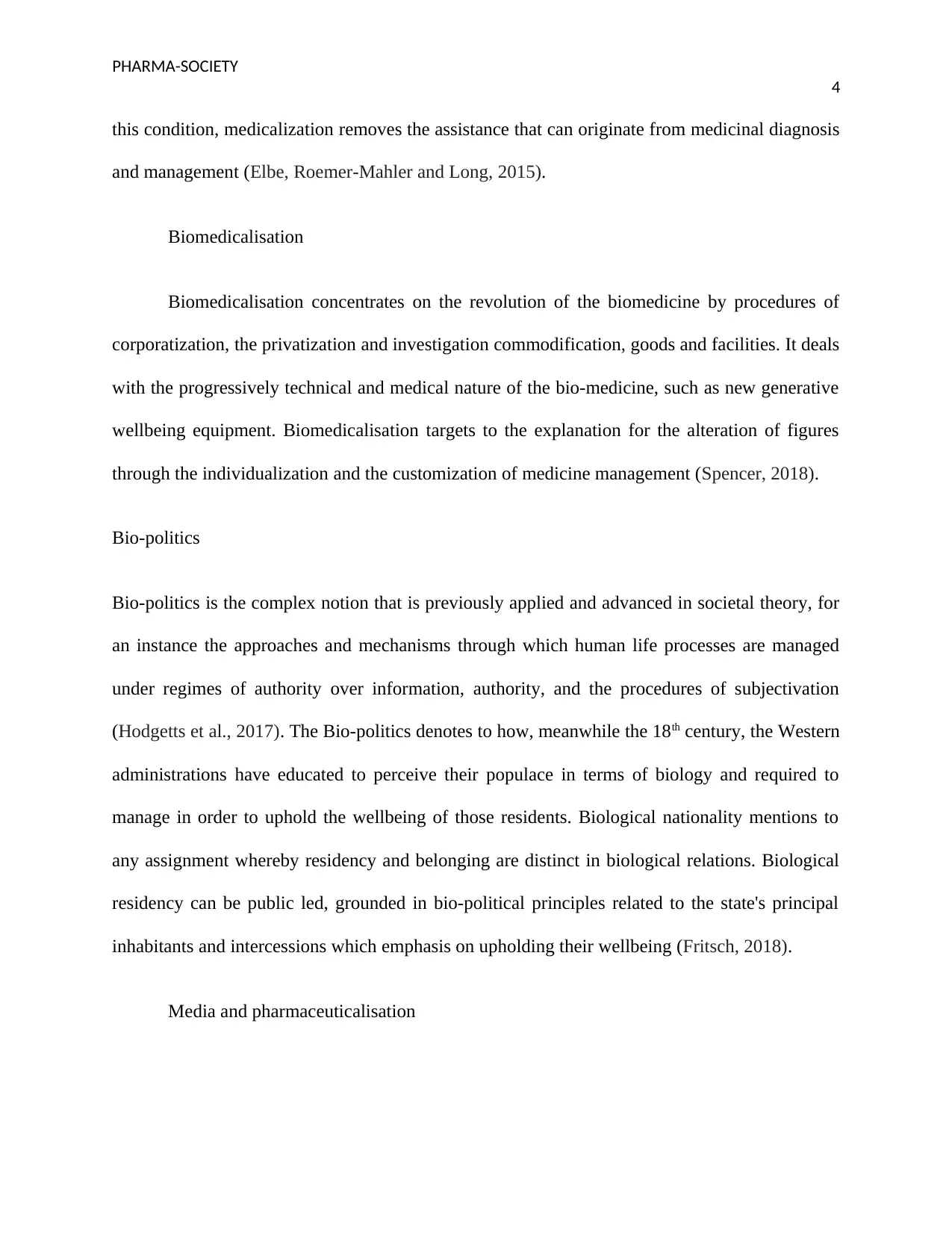
PHARMA-SOCIETY
4
this condition, medicalization removes the assistance that can originate from medicinal diagnosis
and management (Elbe, Roemer-Mahler and Long, 2015).
Biomedicalisation
Biomedicalisation concentrates on the revolution of the biomedicine by procedures of
corporatization, the privatization and investigation commodification, goods and facilities. It deals
with the progressively technical and medical nature of the bio-medicine, such as new generative
wellbeing equipment. Biomedicalisation targets to the explanation for the alteration of figures
through the individualization and the customization of medicine management (Spencer, 2018).
Bio-politics
Bio-politics is the complex notion that is previously applied and advanced in societal theory, for
an instance the approaches and mechanisms through which human life processes are managed
under regimes of authority over information, authority, and the procedures of subjectivation
(Hodgetts et al., 2017). The Bio-politics denotes to how, meanwhile the 18th century, the Western
administrations have educated to perceive their populace in terms of biology and required to
manage in order to uphold the wellbeing of those residents. Biological nationality mentions to
any assignment whereby residency and belonging are distinct in biological relations. Biological
residency can be public led, grounded in bio-political principles related to the state's principal
inhabitants and intercessions which emphasis on upholding their wellbeing (Fritsch, 2018).
Media and pharmaceuticalisation
4
this condition, medicalization removes the assistance that can originate from medicinal diagnosis
and management (Elbe, Roemer-Mahler and Long, 2015).
Biomedicalisation
Biomedicalisation concentrates on the revolution of the biomedicine by procedures of
corporatization, the privatization and investigation commodification, goods and facilities. It deals
with the progressively technical and medical nature of the bio-medicine, such as new generative
wellbeing equipment. Biomedicalisation targets to the explanation for the alteration of figures
through the individualization and the customization of medicine management (Spencer, 2018).
Bio-politics
Bio-politics is the complex notion that is previously applied and advanced in societal theory, for
an instance the approaches and mechanisms through which human life processes are managed
under regimes of authority over information, authority, and the procedures of subjectivation
(Hodgetts et al., 2017). The Bio-politics denotes to how, meanwhile the 18th century, the Western
administrations have educated to perceive their populace in terms of biology and required to
manage in order to uphold the wellbeing of those residents. Biological nationality mentions to
any assignment whereby residency and belonging are distinct in biological relations. Biological
residency can be public led, grounded in bio-political principles related to the state's principal
inhabitants and intercessions which emphasis on upholding their wellbeing (Fritsch, 2018).
Media and pharmaceuticalisation
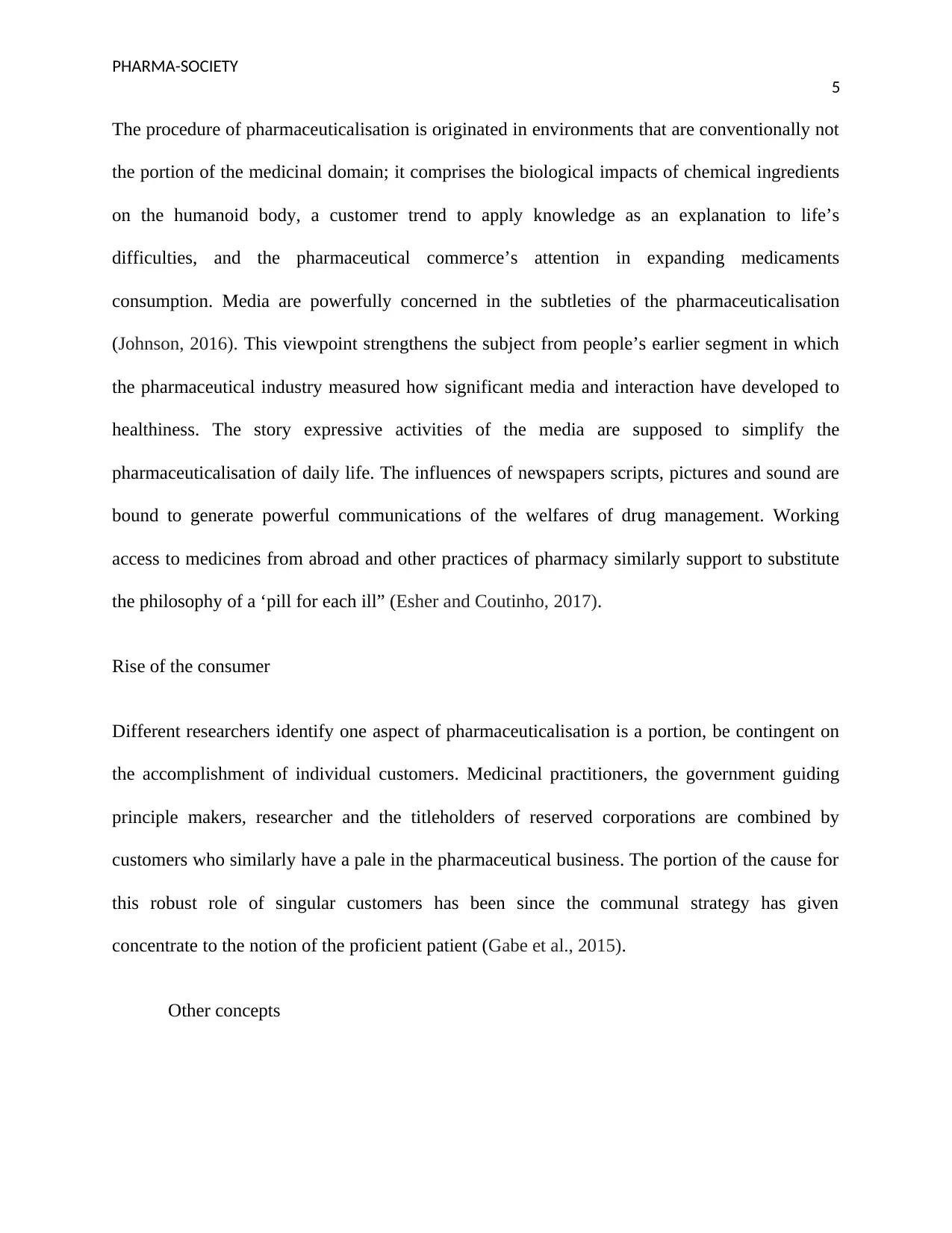
PHARMA-SOCIETY
5
The procedure of pharmaceuticalisation is originated in environments that are conventionally not
the portion of the medicinal domain; it comprises the biological impacts of chemical ingredients
on the humanoid body, a customer trend to apply knowledge as an explanation to life’s
difficulties, and the pharmaceutical commerce’s attention in expanding medicaments
consumption. Media are powerfully concerned in the subtleties of the pharmaceuticalisation
(Johnson, 2016). This viewpoint strengthens the subject from people’s earlier segment in which
the pharmaceutical industry measured how significant media and interaction have developed to
healthiness. The story expressive activities of the media are supposed to simplify the
pharmaceuticalisation of daily life. The influences of newspapers scripts, pictures and sound are
bound to generate powerful communications of the welfares of drug management. Working
access to medicines from abroad and other practices of pharmacy similarly support to substitute
the philosophy of a ‘pill for each ill” (Esher and Coutinho, 2017).
Rise of the consumer
Different researchers identify one aspect of pharmaceuticalisation is a portion, be contingent on
the accomplishment of individual customers. Medicinal practitioners, the government guiding
principle makers, researcher and the titleholders of reserved corporations are combined by
customers who similarly have a pale in the pharmaceutical business. The portion of the cause for
this robust role of singular customers has been since the communal strategy has given
concentrate to the notion of the proficient patient (Gabe et al., 2015).
Other concepts
5
The procedure of pharmaceuticalisation is originated in environments that are conventionally not
the portion of the medicinal domain; it comprises the biological impacts of chemical ingredients
on the humanoid body, a customer trend to apply knowledge as an explanation to life’s
difficulties, and the pharmaceutical commerce’s attention in expanding medicaments
consumption. Media are powerfully concerned in the subtleties of the pharmaceuticalisation
(Johnson, 2016). This viewpoint strengthens the subject from people’s earlier segment in which
the pharmaceutical industry measured how significant media and interaction have developed to
healthiness. The story expressive activities of the media are supposed to simplify the
pharmaceuticalisation of daily life. The influences of newspapers scripts, pictures and sound are
bound to generate powerful communications of the welfares of drug management. Working
access to medicines from abroad and other practices of pharmacy similarly support to substitute
the philosophy of a ‘pill for each ill” (Esher and Coutinho, 2017).
Rise of the consumer
Different researchers identify one aspect of pharmaceuticalisation is a portion, be contingent on
the accomplishment of individual customers. Medicinal practitioners, the government guiding
principle makers, researcher and the titleholders of reserved corporations are combined by
customers who similarly have a pale in the pharmaceutical business. The portion of the cause for
this robust role of singular customers has been since the communal strategy has given
concentrate to the notion of the proficient patient (Gabe et al., 2015).
Other concepts
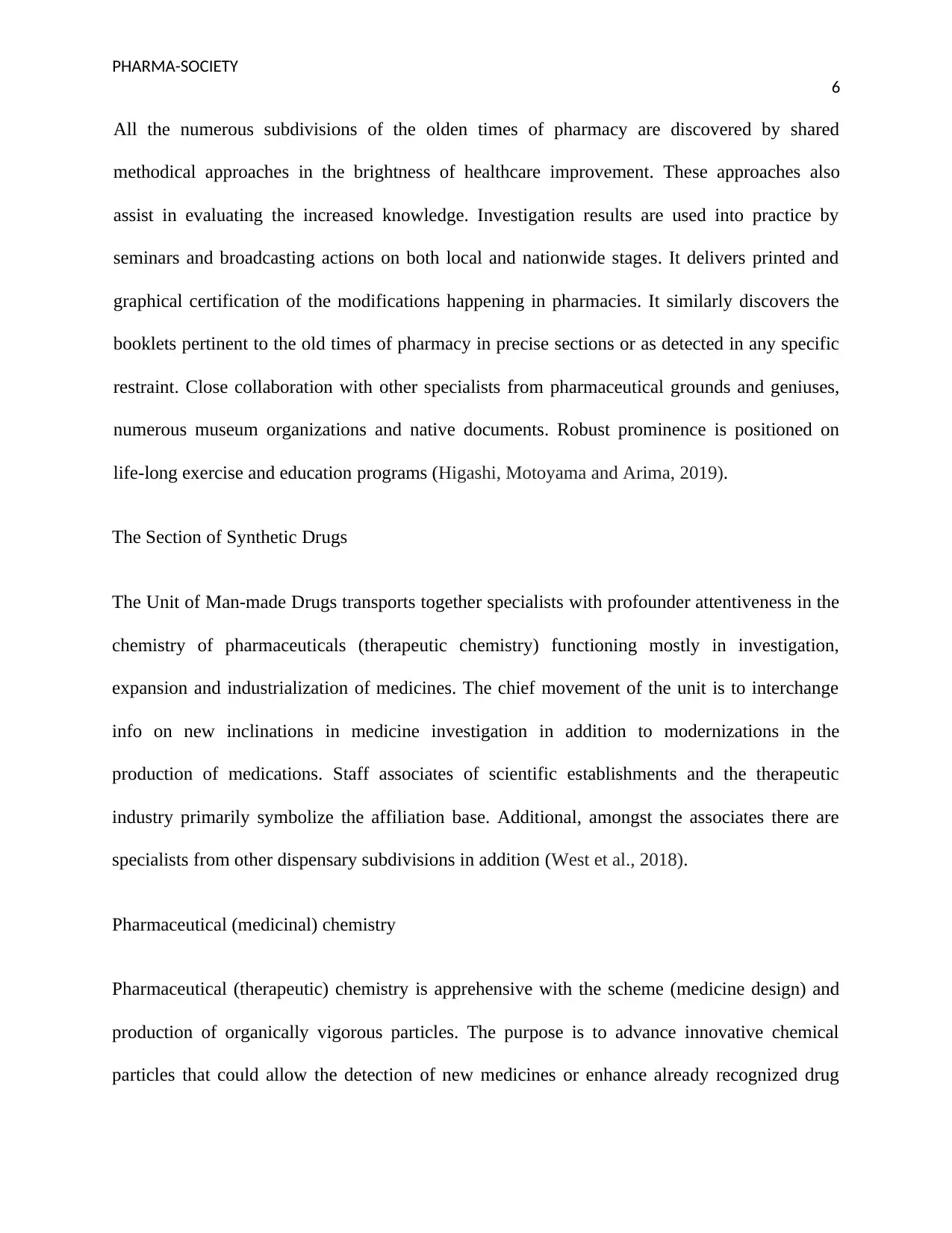
PHARMA-SOCIETY
6
All the numerous subdivisions of the olden times of pharmacy are discovered by shared
methodical approaches in the brightness of healthcare improvement. These approaches also
assist in evaluating the increased knowledge. Investigation results are used into practice by
seminars and broadcasting actions on both local and nationwide stages. It delivers printed and
graphical certification of the modifications happening in pharmacies. It similarly discovers the
booklets pertinent to the old times of pharmacy in precise sections or as detected in any specific
restraint. Close collaboration with other specialists from pharmaceutical grounds and geniuses,
numerous museum organizations and native documents. Robust prominence is positioned on
life-long exercise and education programs (Higashi, Motoyama and Arima, 2019).
The Section of Synthetic Drugs
The Unit of Man-made Drugs transports together specialists with profounder attentiveness in the
chemistry of pharmaceuticals (therapeutic chemistry) functioning mostly in investigation,
expansion and industrialization of medicines. The chief movement of the unit is to interchange
info on new inclinations in medicine investigation in addition to modernizations in the
production of medications. Staff associates of scientific establishments and the therapeutic
industry primarily symbolize the affiliation base. Additional, amongst the associates there are
specialists from other dispensary subdivisions in addition (West et al., 2018).
Pharmaceutical (medicinal) chemistry
Pharmaceutical (therapeutic) chemistry is apprehensive with the scheme (medicine design) and
production of organically vigorous particles. The purpose is to advance innovative chemical
particles that could allow the detection of new medicines or enhance already recognized drug
6
All the numerous subdivisions of the olden times of pharmacy are discovered by shared
methodical approaches in the brightness of healthcare improvement. These approaches also
assist in evaluating the increased knowledge. Investigation results are used into practice by
seminars and broadcasting actions on both local and nationwide stages. It delivers printed and
graphical certification of the modifications happening in pharmacies. It similarly discovers the
booklets pertinent to the old times of pharmacy in precise sections or as detected in any specific
restraint. Close collaboration with other specialists from pharmaceutical grounds and geniuses,
numerous museum organizations and native documents. Robust prominence is positioned on
life-long exercise and education programs (Higashi, Motoyama and Arima, 2019).
The Section of Synthetic Drugs
The Unit of Man-made Drugs transports together specialists with profounder attentiveness in the
chemistry of pharmaceuticals (therapeutic chemistry) functioning mostly in investigation,
expansion and industrialization of medicines. The chief movement of the unit is to interchange
info on new inclinations in medicine investigation in addition to modernizations in the
production of medications. Staff associates of scientific establishments and the therapeutic
industry primarily symbolize the affiliation base. Additional, amongst the associates there are
specialists from other dispensary subdivisions in addition (West et al., 2018).
Pharmaceutical (medicinal) chemistry
Pharmaceutical (therapeutic) chemistry is apprehensive with the scheme (medicine design) and
production of organically vigorous particles. The purpose is to advance innovative chemical
particles that could allow the detection of new medicines or enhance already recognized drug
Paraphrase This Document
Need a fresh take? Get an instant paraphrase of this document with our AI Paraphraser
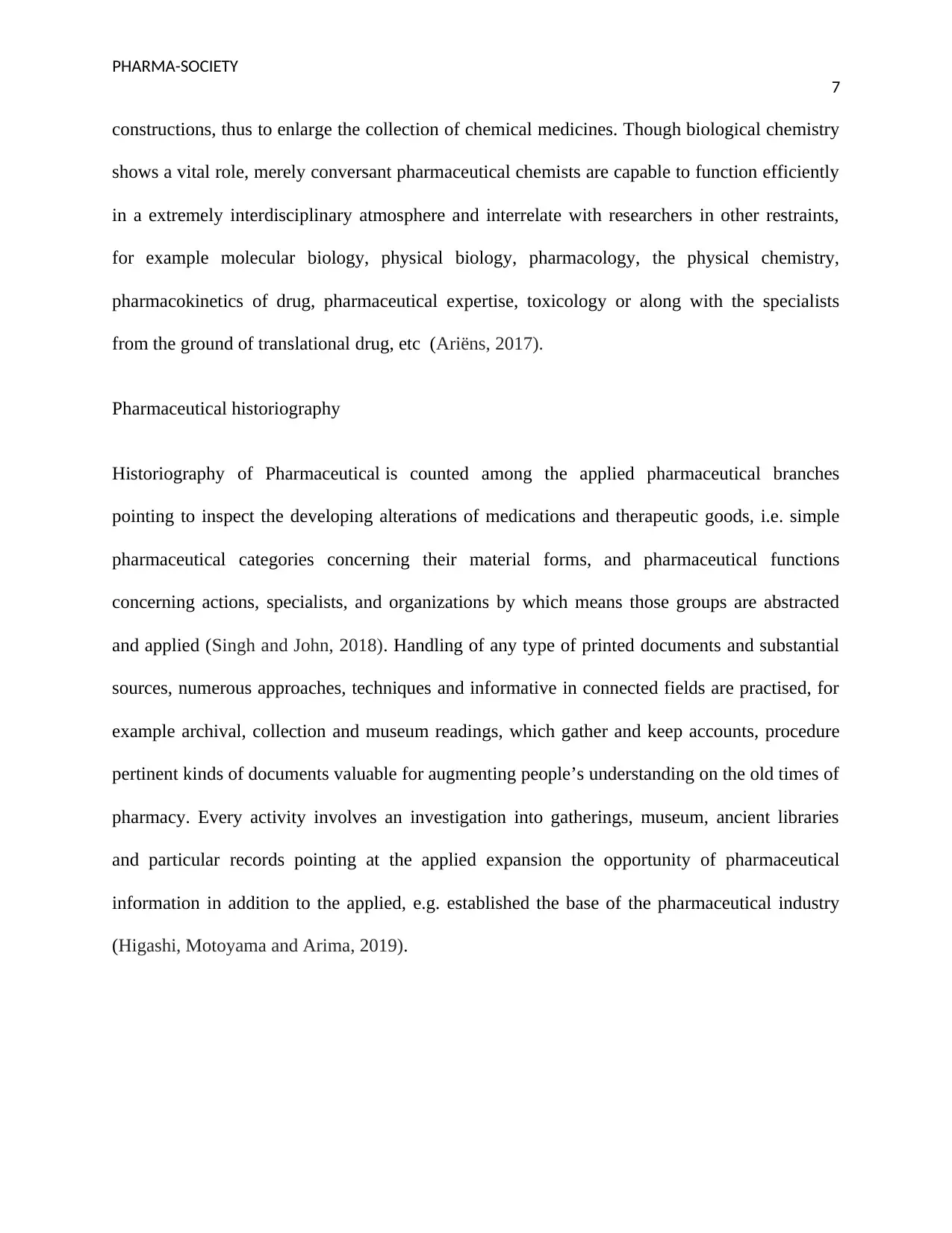
PHARMA-SOCIETY
7
constructions, thus to enlarge the collection of chemical medicines. Though biological chemistry
shows a vital role, merely conversant pharmaceutical chemists are capable to function efficiently
in a extremely interdisciplinary atmosphere and interrelate with researchers in other restraints,
for example molecular biology, physical biology, pharmacology, the physical chemistry,
pharmacokinetics of drug, pharmaceutical expertise, toxicology or along with the specialists
from the ground of translational drug, etc (Ariëns, 2017).
Pharmaceutical historiography
Historiography of Pharmaceutical is counted among the applied pharmaceutical branches
pointing to inspect the developing alterations of medications and therapeutic goods, i.e. simple
pharmaceutical categories concerning their material forms, and pharmaceutical functions
concerning actions, specialists, and organizations by which means those groups are abstracted
and applied (Singh and John, 2018). Handling of any type of printed documents and substantial
sources, numerous approaches, techniques and informative in connected fields are practised, for
example archival, collection and museum readings, which gather and keep accounts, procedure
pertinent kinds of documents valuable for augmenting people’s understanding on the old times of
pharmacy. Every activity involves an investigation into gatherings, museum, ancient libraries
and particular records pointing at the applied expansion the opportunity of pharmaceutical
information in addition to the applied, e.g. established the base of the pharmaceutical industry
(Higashi, Motoyama and Arima, 2019).
7
constructions, thus to enlarge the collection of chemical medicines. Though biological chemistry
shows a vital role, merely conversant pharmaceutical chemists are capable to function efficiently
in a extremely interdisciplinary atmosphere and interrelate with researchers in other restraints,
for example molecular biology, physical biology, pharmacology, the physical chemistry,
pharmacokinetics of drug, pharmaceutical expertise, toxicology or along with the specialists
from the ground of translational drug, etc (Ariëns, 2017).
Pharmaceutical historiography
Historiography of Pharmaceutical is counted among the applied pharmaceutical branches
pointing to inspect the developing alterations of medications and therapeutic goods, i.e. simple
pharmaceutical categories concerning their material forms, and pharmaceutical functions
concerning actions, specialists, and organizations by which means those groups are abstracted
and applied (Singh and John, 2018). Handling of any type of printed documents and substantial
sources, numerous approaches, techniques and informative in connected fields are practised, for
example archival, collection and museum readings, which gather and keep accounts, procedure
pertinent kinds of documents valuable for augmenting people’s understanding on the old times of
pharmacy. Every activity involves an investigation into gatherings, museum, ancient libraries
and particular records pointing at the applied expansion the opportunity of pharmaceutical
information in addition to the applied, e.g. established the base of the pharmaceutical industry
(Higashi, Motoyama and Arima, 2019).
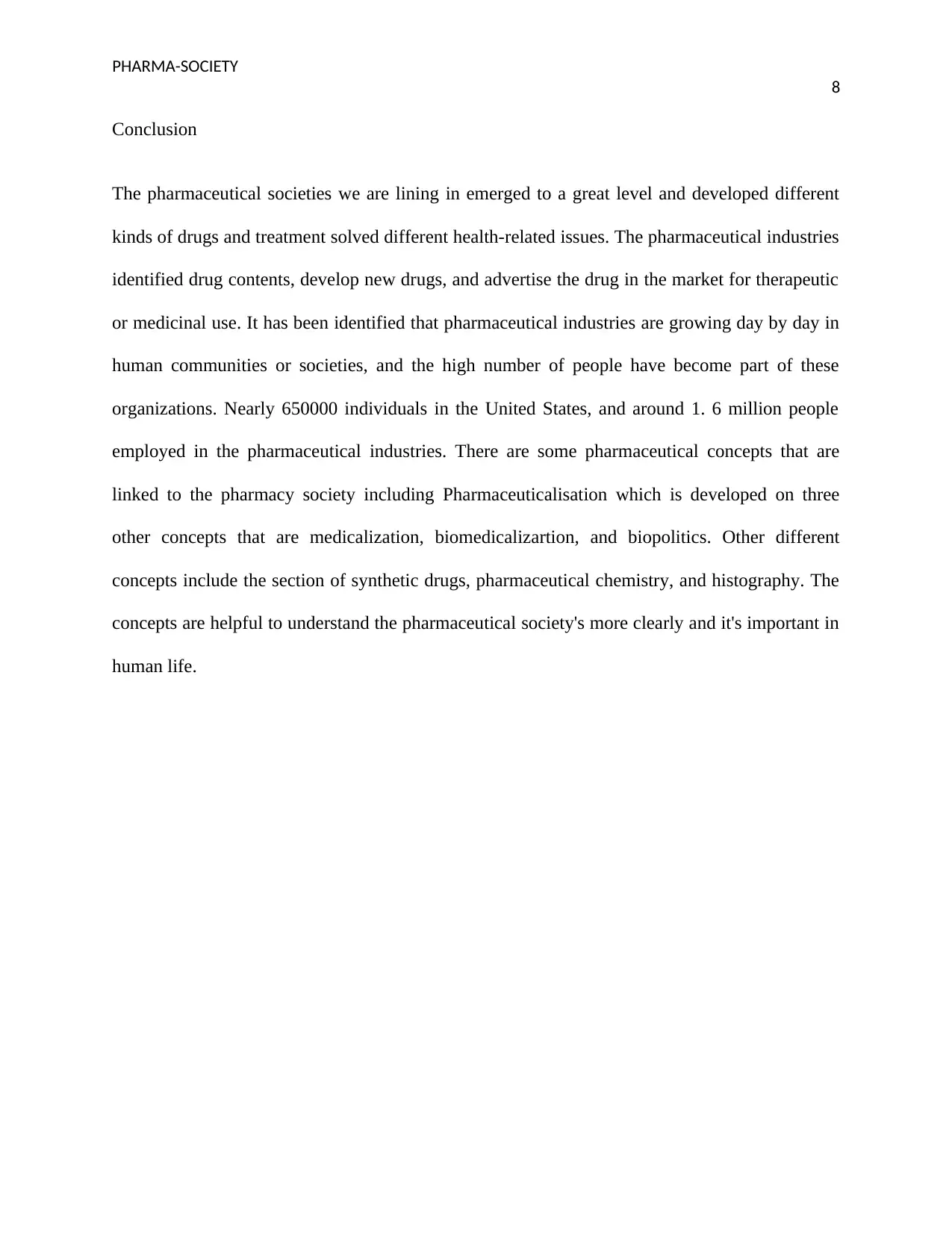
PHARMA-SOCIETY
8
Conclusion
The pharmaceutical societies we are lining in emerged to a great level and developed different
kinds of drugs and treatment solved different health-related issues. The pharmaceutical industries
identified drug contents, develop new drugs, and advertise the drug in the market for therapeutic
or medicinal use. It has been identified that pharmaceutical industries are growing day by day in
human communities or societies, and the high number of people have become part of these
organizations. Nearly 650000 individuals in the United States, and around 1. 6 million people
employed in the pharmaceutical industries. There are some pharmaceutical concepts that are
linked to the pharmacy society including Pharmaceuticalisation which is developed on three
other concepts that are medicalization, biomedicalizartion, and biopolitics. Other different
concepts include the section of synthetic drugs, pharmaceutical chemistry, and histography. The
concepts are helpful to understand the pharmaceutical society's more clearly and it's important in
human life.
8
Conclusion
The pharmaceutical societies we are lining in emerged to a great level and developed different
kinds of drugs and treatment solved different health-related issues. The pharmaceutical industries
identified drug contents, develop new drugs, and advertise the drug in the market for therapeutic
or medicinal use. It has been identified that pharmaceutical industries are growing day by day in
human communities or societies, and the high number of people have become part of these
organizations. Nearly 650000 individuals in the United States, and around 1. 6 million people
employed in the pharmaceutical industries. There are some pharmaceutical concepts that are
linked to the pharmacy society including Pharmaceuticalisation which is developed on three
other concepts that are medicalization, biomedicalizartion, and biopolitics. Other different
concepts include the section of synthetic drugs, pharmaceutical chemistry, and histography. The
concepts are helpful to understand the pharmaceutical society's more clearly and it's important in
human life.
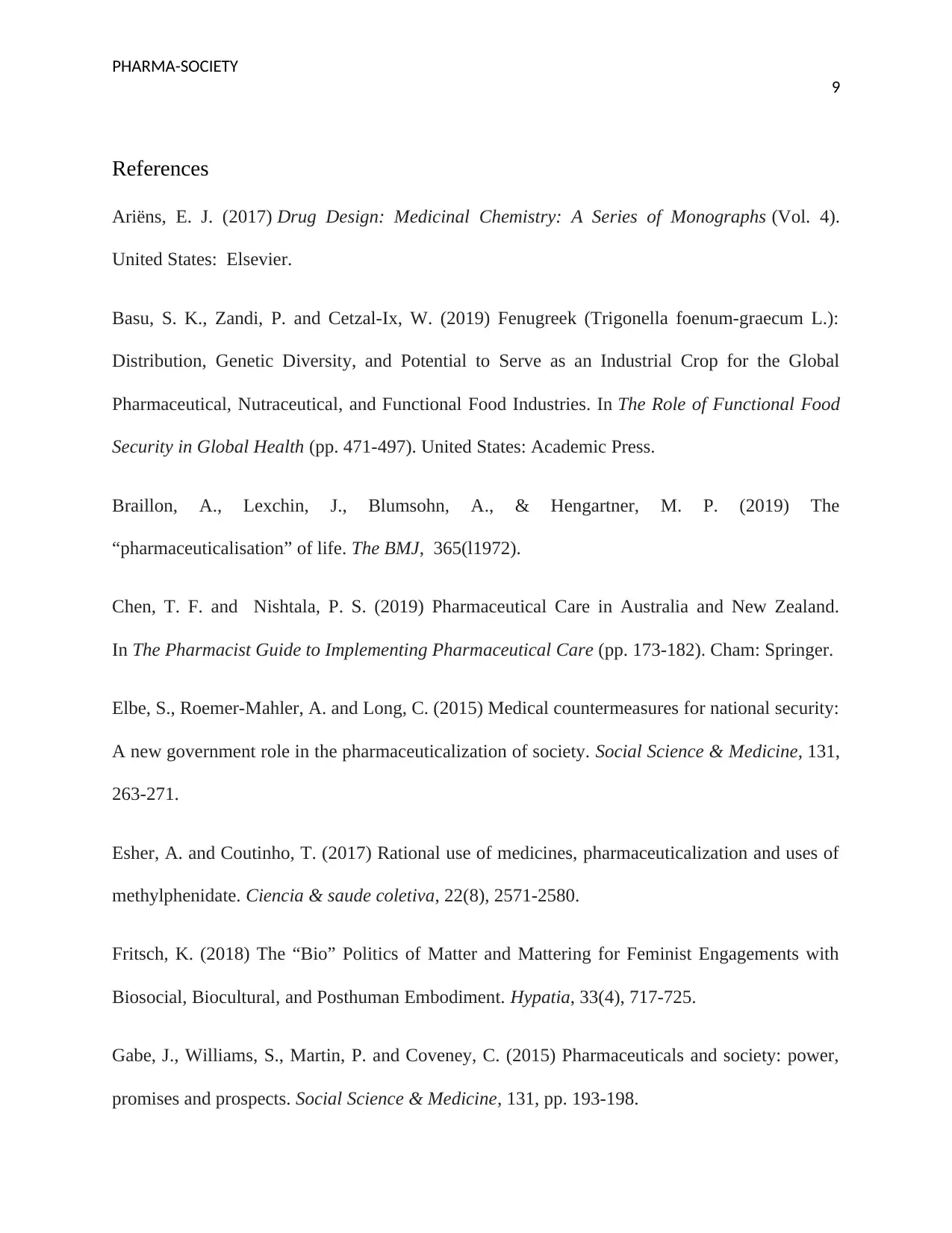
PHARMA-SOCIETY
9
References
Ariëns, E. J. (2017) Drug Design: Medicinal Chemistry: A Series of Monographs (Vol. 4).
United States: Elsevier.
Basu, S. K., Zandi, P. and Cetzal-Ix, W. (2019) Fenugreek (Trigonella foenum-graecum L.):
Distribution, Genetic Diversity, and Potential to Serve as an Industrial Crop for the Global
Pharmaceutical, Nutraceutical, and Functional Food Industries. In The Role of Functional Food
Security in Global Health (pp. 471-497). United States: Academic Press.
Braillon, A., Lexchin, J., Blumsohn, A., & Hengartner, M. P. (2019) The
“pharmaceuticalisation” of life. The BMJ, 365(l1972).
Chen, T. F. and Nishtala, P. S. (2019) Pharmaceutical Care in Australia and New Zealand.
In The Pharmacist Guide to Implementing Pharmaceutical Care (pp. 173-182). Cham: Springer.
Elbe, S., Roemer-Mahler, A. and Long, C. (2015) Medical countermeasures for national security:
A new government role in the pharmaceuticalization of society. Social Science & Medicine, 131,
263-271.
Esher, A. and Coutinho, T. (2017) Rational use of medicines, pharmaceuticalization and uses of
methylphenidate. Ciencia & saude coletiva, 22(8), 2571-2580.
Fritsch, K. (2018) The “Bio” Politics of Matter and Mattering for Feminist Engagements with
Biosocial, Biocultural, and Posthuman Embodiment. Hypatia, 33(4), 717-725.
Gabe, J., Williams, S., Martin, P. and Coveney, C. (2015) Pharmaceuticals and society: power,
promises and prospects. Social Science & Medicine, 131, pp. 193-198.
9
References
Ariëns, E. J. (2017) Drug Design: Medicinal Chemistry: A Series of Monographs (Vol. 4).
United States: Elsevier.
Basu, S. K., Zandi, P. and Cetzal-Ix, W. (2019) Fenugreek (Trigonella foenum-graecum L.):
Distribution, Genetic Diversity, and Potential to Serve as an Industrial Crop for the Global
Pharmaceutical, Nutraceutical, and Functional Food Industries. In The Role of Functional Food
Security in Global Health (pp. 471-497). United States: Academic Press.
Braillon, A., Lexchin, J., Blumsohn, A., & Hengartner, M. P. (2019) The
“pharmaceuticalisation” of life. The BMJ, 365(l1972).
Chen, T. F. and Nishtala, P. S. (2019) Pharmaceutical Care in Australia and New Zealand.
In The Pharmacist Guide to Implementing Pharmaceutical Care (pp. 173-182). Cham: Springer.
Elbe, S., Roemer-Mahler, A. and Long, C. (2015) Medical countermeasures for national security:
A new government role in the pharmaceuticalization of society. Social Science & Medicine, 131,
263-271.
Esher, A. and Coutinho, T. (2017) Rational use of medicines, pharmaceuticalization and uses of
methylphenidate. Ciencia & saude coletiva, 22(8), 2571-2580.
Fritsch, K. (2018) The “Bio” Politics of Matter and Mattering for Feminist Engagements with
Biosocial, Biocultural, and Posthuman Embodiment. Hypatia, 33(4), 717-725.
Gabe, J., Williams, S., Martin, P. and Coveney, C. (2015) Pharmaceuticals and society: power,
promises and prospects. Social Science & Medicine, 131, pp. 193-198.
Secure Best Marks with AI Grader
Need help grading? Try our AI Grader for instant feedback on your assignments.
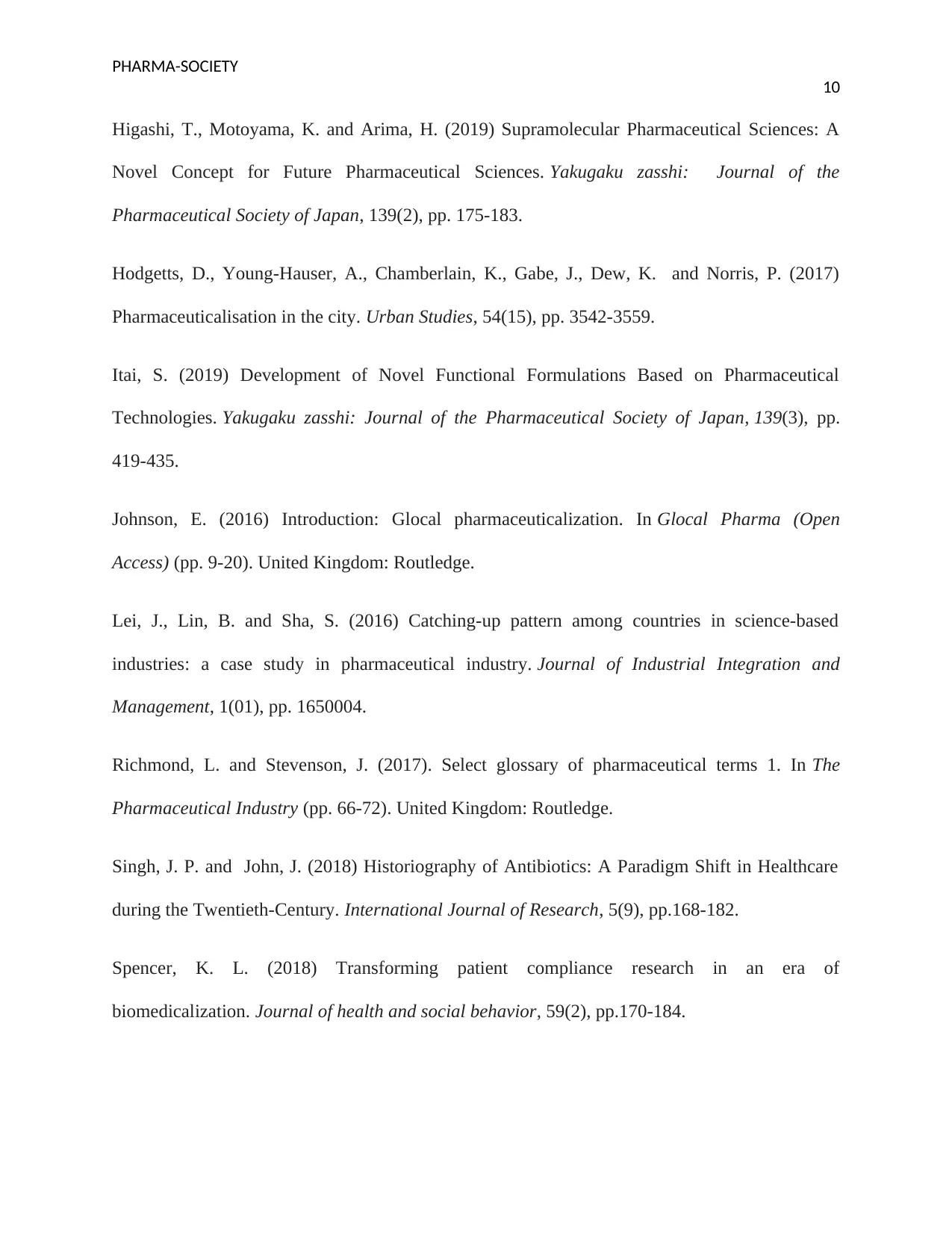
PHARMA-SOCIETY
10
Higashi, T., Motoyama, K. and Arima, H. (2019) Supramolecular Pharmaceutical Sciences: A
Novel Concept for Future Pharmaceutical Sciences. Yakugaku zasshi: Journal of the
Pharmaceutical Society of Japan, 139(2), pp. 175-183.
Hodgetts, D., Young-Hauser, A., Chamberlain, K., Gabe, J., Dew, K. and Norris, P. (2017)
Pharmaceuticalisation in the city. Urban Studies, 54(15), pp. 3542-3559.
Itai, S. (2019) Development of Novel Functional Formulations Based on Pharmaceutical
Technologies. Yakugaku zasshi: Journal of the Pharmaceutical Society of Japan, 139(3), pp.
419-435.
Johnson, E. (2016) Introduction: Glocal pharmaceuticalization. In Glocal Pharma (Open
Access) (pp. 9-20). United Kingdom: Routledge.
Lei, J., Lin, B. and Sha, S. (2016) Catching-up pattern among countries in science-based
industries: a case study in pharmaceutical industry. Journal of Industrial Integration and
Management, 1(01), pp. 1650004.
Richmond, L. and Stevenson, J. (2017). Select glossary of pharmaceutical terms 1. In The
Pharmaceutical Industry (pp. 66-72). United Kingdom: Routledge.
Singh, J. P. and John, J. (2018) Historiography of Antibiotics: A Paradigm Shift in Healthcare
during the Twentieth-Century. International Journal of Research, 5(9), pp.168-182.
Spencer, K. L. (2018) Transforming patient compliance research in an era of
biomedicalization. Journal of health and social behavior, 59(2), pp.170-184.
10
Higashi, T., Motoyama, K. and Arima, H. (2019) Supramolecular Pharmaceutical Sciences: A
Novel Concept for Future Pharmaceutical Sciences. Yakugaku zasshi: Journal of the
Pharmaceutical Society of Japan, 139(2), pp. 175-183.
Hodgetts, D., Young-Hauser, A., Chamberlain, K., Gabe, J., Dew, K. and Norris, P. (2017)
Pharmaceuticalisation in the city. Urban Studies, 54(15), pp. 3542-3559.
Itai, S. (2019) Development of Novel Functional Formulations Based on Pharmaceutical
Technologies. Yakugaku zasshi: Journal of the Pharmaceutical Society of Japan, 139(3), pp.
419-435.
Johnson, E. (2016) Introduction: Glocal pharmaceuticalization. In Glocal Pharma (Open
Access) (pp. 9-20). United Kingdom: Routledge.
Lei, J., Lin, B. and Sha, S. (2016) Catching-up pattern among countries in science-based
industries: a case study in pharmaceutical industry. Journal of Industrial Integration and
Management, 1(01), pp. 1650004.
Richmond, L. and Stevenson, J. (2017). Select glossary of pharmaceutical terms 1. In The
Pharmaceutical Industry (pp. 66-72). United Kingdom: Routledge.
Singh, J. P. and John, J. (2018) Historiography of Antibiotics: A Paradigm Shift in Healthcare
during the Twentieth-Century. International Journal of Research, 5(9), pp.168-182.
Spencer, K. L. (2018) Transforming patient compliance research in an era of
biomedicalization. Journal of health and social behavior, 59(2), pp.170-184.
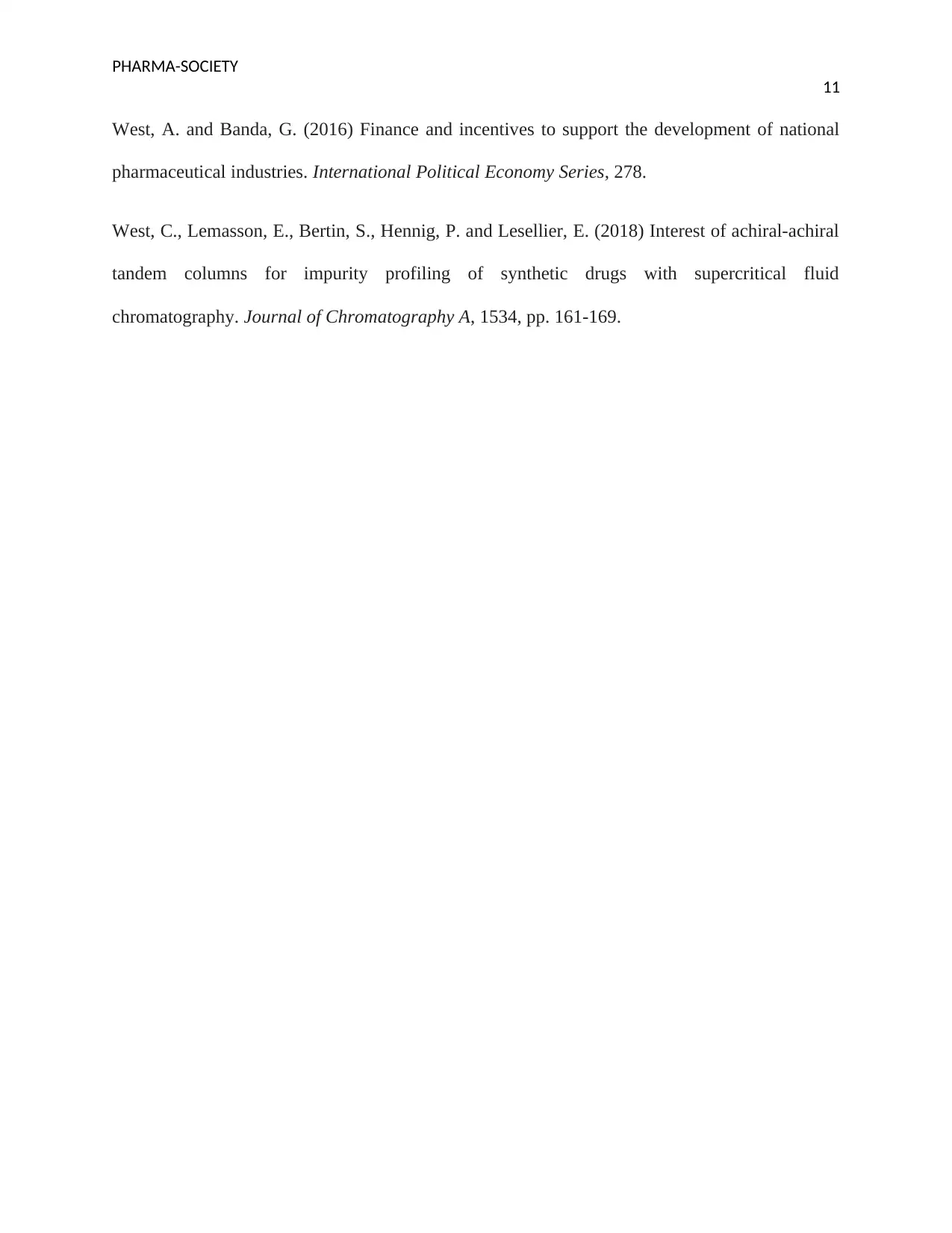
PHARMA-SOCIETY
11
West, A. and Banda, G. (2016) Finance and incentives to support the development of national
pharmaceutical industries. International Political Economy Series, 278.
West, C., Lemasson, E., Bertin, S., Hennig, P. and Lesellier, E. (2018) Interest of achiral-achiral
tandem columns for impurity profiling of synthetic drugs with supercritical fluid
chromatography. Journal of Chromatography A, 1534, pp. 161-169.
11
West, A. and Banda, G. (2016) Finance and incentives to support the development of national
pharmaceutical industries. International Political Economy Series, 278.
West, C., Lemasson, E., Bertin, S., Hennig, P. and Lesellier, E. (2018) Interest of achiral-achiral
tandem columns for impurity profiling of synthetic drugs with supercritical fluid
chromatography. Journal of Chromatography A, 1534, pp. 161-169.
1 out of 12
Related Documents
Your All-in-One AI-Powered Toolkit for Academic Success.
+13062052269
info@desklib.com
Available 24*7 on WhatsApp / Email
![[object Object]](/_next/static/media/star-bottom.7253800d.svg)
Unlock your academic potential
© 2024 | Zucol Services PVT LTD | All rights reserved.





